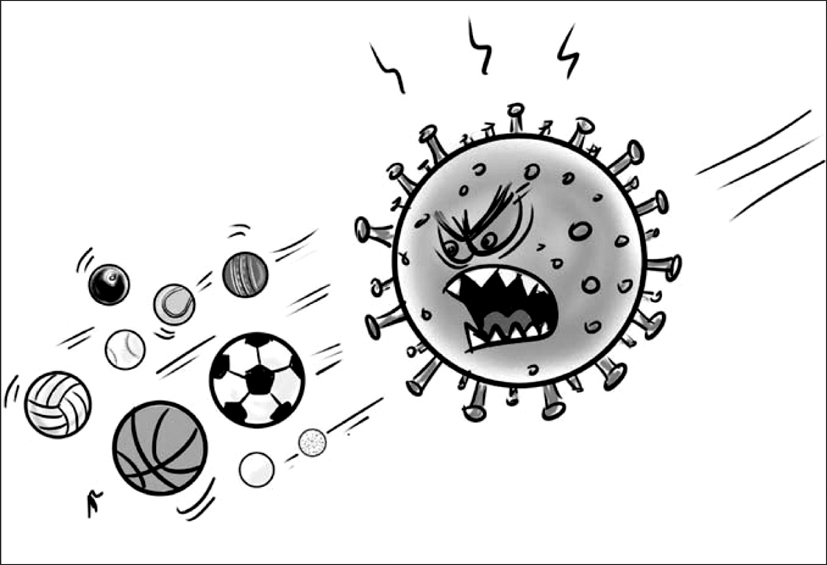Registered with the Registrar of Newspapers for India under R.N.I 53640/91
Vol. XXX No. 8, August 16-31, 2020
What is Life Without Sport?
by Partab Ramchand
Even World War II couldn’t put a stop to sport altogether. Yes, international events obviously could not be held but the domestic cricket calendar for example in India, South Africa, Australia and West Indies was gone through and in fact Ceylon and India exchanged tours in 1940-41 and 1944-45. The coronavirus, however, is something else, says Partab Ramchand, explaining how it has impacted sport.
Yes, the coronavirus indeed is something else. It has put a halt to sports events altogether, local, national and international. And we were all under the impression that the joys of sport could always be experienced at any time, all the time, thanks to the numerous events worldwide and the non-stop coverage on television and the internet. We all thought that sport would never stop and we would feel the thrill and excitement that only a Wimbledon or the Olympic Games could provide. Well, we now have to do without these mega events. Both have been put off by a year as also the Euro Cup football. Another major event, Formula I racing, is effectively over for the season even before a car could be rolled out on to the circuit. The French Open has been pushed to September instead of May, there is no word when the Premier League football will commence and the IPL in all probability will be played in Dubai. This is a surreal experience. Teams and athletes have, in the past, played through torment and turbulence, braving bloody wars and bitter political conflicts. Over the years, sport has evolved into something more than just entertainment. It is a perennial source of optimism, a universal healer tailored to deal with grim times. At least it was until now, when a scary virus has forced so many of us to retreat into lockdown and has left administrators with no choice but to postpone sports fixtures all across the world. Experiencing sport has never been just a pastime, but a way of life, an escape from the mundane of daily schedules, a gateway to undiluted happiness and a kind of therapy for the soul. And that is why in these grim times we should perhaps not just miss sport but also appreciate and celebrate it. The hollowness so many of us are feeling at present is a reminder that the show the elite athletes put on for us week in and week out is a privilege we must cherish.
As much as so many of us live and breathe sport, catastrophes such as the virus help put things into perspective. In the face of families losing loved ones, carrying on with any kind of sport is just plain unfeeling and uncaring. Indeed, the very idea of sport suddenly sounds meaningless.

After all, the global commercialisation of sport has ensured that we are bombarded with so much of it that we seem to have forgotten its true value. In a way, the mindless consumption of sport has meant that it has been drained of all its charm. This time-off will perhaps give us an opportunity to introspect and reclaim some of that. That way, once it is all over, once the athletes return and stadiums open, we will be able to enjoy it even more. And who knows, once normalcy is restored, sport may offer the healing touch it almost always does, uniting grieving people and springing hope by infusing a rare kind of universal power only it has the capacity to wield.
But the question is, when will this happen? When will the athletes return, when will the stadiums open and when shall we sports lovers experience the frenzy of the action-packed moments, the ethereal skills and the dramatic denouements? Medical experts have warned that resuming anything this year could mean putting lives at risk. Even the most conservative estimates have put the comeback of sporting activity at at least six months into the future.
Most are of the view that while sport is great, at the moment the focus is on saving lives, and having sports events which attract large crowds could prove to be disastrous. The experts feel that since the transmission rate is very high, it should be completely avoided for a substantial period of time even though sport encourages physical and mental well-being.
There has been talk of conducting events without an audience – even though this would be anathema to the genuine sports lover for what is sport without spectators – but doctors are of the view that even this is not advisable at this point of time. “It can be done when things improve, but even then it will be risky as it involves players, officials, organisers and so many staff, the chances of getting infected will always be there,” is the general refrain.
Yes it may be some time for the action to commence and all that we sports lovers can do is to hope that it is sooner rather than later. For what is life without sport?

